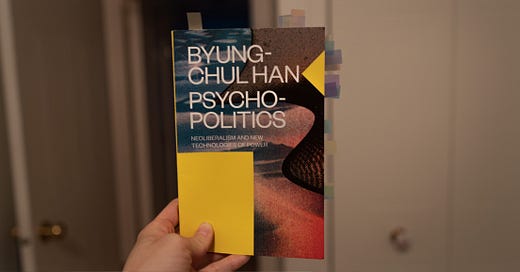Psychopolitics: Neoliberalism and New Technologies of Power by Byung-Chul Han
Book overview and Thoughts - Beyond Thought
In his work “Discipline and Punish,” Foucault discusses the concept of biopolitics, according to which society controls and disciplines the body. As an adaptation of this concept, Byung-Chul Han asserts that society now regulates both the body and the mind. Giving to his work the title of “Psychopolitics.”
Byung talks specifically about Foucault’s theory of panopticism, that develops the idea of how punishment works in modern society.
To give some context, a panopticon is a prison design, created by Jeremy Bentham, that has a tower in the middle from which all prisoners can be observed. Each prisoner is visible, but they are unable to interact with any guards or other prisoners. Despite the fact that individuals are never sure when they are being watched, this generates the impression that they are constantly under observation. As a result of the fear of being observed, prisoners become more compliant.
In order to critique how our conscience responds to this sense of authority in our daily activities, Foucault revisits this model to represent contemporary society. In our daily lives, we impose ourselves just as we follow some rules even though they aren't being formally observed by an authority at the moment. Byung argues that this theory of panopticism is no longer relevant since we are no longer coerced into behaving; instead, we choose to do so. We sell our data and install Alexas on our homes, without anyone forcing us. We do not need to say anything or confess, we just do it, and this leads to extreme social control, because rather than authority having the control of our bodies; now they have the control of our psyches. Power does not work on the body, but on the mind.
Byung also examines the neoliberalism ideology and how it has impacted our psyche. He discusses the decline of our sense of freedom and how technology dominance redefines authority as a silent force that completely exploits people's unconscious and turns them into dependents rather than compliant individuals.
Unquestionably, the age of coercion is upon us, and paradoxically, freedom is the opposite of coercion and compulsion. Neoliberalism is the definition of unfreedom; it exploits freedom and transforms it. Neoliberalism uses individual freedom to transform individuals into capital, rendering them to unfreedom. Individuals are now both slaves and masters, they turn themselves into entrepreneurs. Aggression is now directed at ourselves rather than to the system. Individuals now work for capital and wealth, rather than for their basic needs. In other words, neoliberalism creates new needs, because “you are free to do what you want within my choices.”
Neoliberalism demands an everlasting need of self-optimization, to make the individual functional within the system. Everything must be done to ensure that the market is successful and continues to grow.
“Even though Marx speaks of "Capital" being man himself, human beings, endowed with ‘general intellect,’ are now transforming themselves into Capital. In contrast, true freedom would be possible only if life were entirely freed from Capital — which represents a new form of transcendence. The transcendence of Capital stands in the way of life as immanence.” - Byung-Chul Han
The section of the book where Byung discusses how neoliberalism gamifies work to increase productivity is quite striking and something I really enjoyed. When things are seen as games, motivation, a sense of accomplishment, and rewards are produced. Every aspect of modern capitalism is being gamified, from “likes,” to Tinder “matches,” to driving more for Uber to earn more and better “reviews,” to “followers” and “subscribers” who compete to have the highest numbers or scores. Now we aren’t just trying to be the best in the market, but also the best player. Our information society means that capitalism needs to find ways to get the data it needs to keep growing, and gamifying their products has been the best choice so far.
Lastly, I found the book’s final section, “Idiotism,” to be incredibly insightful. According to Byung, philosophers are idiots. Intelligent individuals of today only make decisions. Intelligent people have no access to the outside world and are dependent on the options the system presents. Nowadays, intelligence follows a system’s logic rather than making independent decisions, and anyone who differs from the system is called an idiot. The Other is not accessible to intelligence. The idiot chooses to reject, in the modern sense of the word, “intelligence,” by looking outside of the current system. The idiot is a utopian character who opposes being entirely networked and monitored; he or she is not interconnected and refuses to participate in the digital panopticon we live on today.
Make sure to subscribe to be added to the mailing list and receive fresh content like this directly in your inbox!





I'm already a fan of this korean philosopher. Pretty interesting!